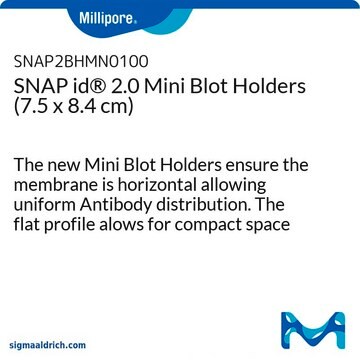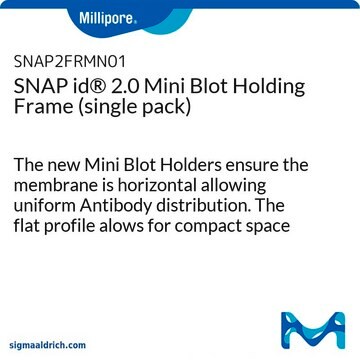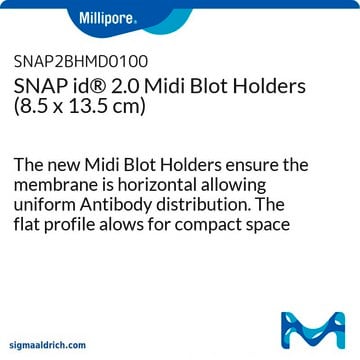SNAP2MINI
SNAP id® 2.0 Protein Detection System-Mini
7.5 x 8.4 cm, Unique vacuum-driven technology & a built-in flow distributor actively drive reagents through the membrane
Synonym(s):
Protein detection kit
About This Item
Recommended Products
Product Name
SNAP id® 2.0 Protein Detection System-Mini (7.5 x 8.4 cm), Developed to meet the needs of our Western blotting customers, the SNAP i.d. 2.0 system produces blots of a very high quality. Unique vacuum-driven technology & a built-in flow distributor actively drive reagents through the membrane..
manufacturer/tradename
SNAP id®
technique(s)
western blot: suitable
compatibility
for use with Commercially available blocking reagents
for use with Luminata Western HRP Substrates
for use with Nitrocellulose
for use with PVDF (Immobilon membranes)
for use with blØk<TMSYMBOL></TMSYMBOL>-CH Buffer (cat. no. WBAVDCH01)
for use with blØk<TMSYMBOL></TMSYMBOL>-FL Buffer (cat. no. WBAVDFL01)
for use with blØk<TMSYMBOL></TMSYMBOL>-PO Buffer (cat. no. WBAVDP001)
for use with commercially available detection reagents
detection method
chemiluminescent
colorimetric
fluorometric
shipped in
ambient
storage temp.
room temp
General description
Application
Features and Benefits
- Processing of up to four blots at a time on a vacuum base with two individually controlled sides
- Comprises of three removable blot holding frame sizes: MultiBlot, Mini, and Midi, to accommodate different blot sizes
- Disposable blot holders, sized for MultiBlot, Mini, and Midi frames
- Blot spacer required with first-generation SNAP id system is now integrated into the new blot holder
- Extended and off-line blot processing options: frames have lids and can be removed from the base for extended incubation (one hour to overnight), incubation in a shaker, or incubation at 4 °C
- Stackable frames so multiple blots can be processed at the same time;30-minute immunodetection with uniform signal across the blot
- Greater than 80% antibody recovery using the SNAP id 2.0 Antibody Collection Trays
- Compatible with nitrocellulose and polyvinylidene fluoride (PVDF) membranes
- Works with the most blocking buffers and visualization methodologies (e.g. chemiluminescence, fluorescence, or colorimetric)
Packaging
Linkage
Other Notes
Legal Information
Certificates of Analysis (COA)
Search for Certificates of Analysis (COA) by entering the products Lot/Batch Number. Lot and Batch Numbers can be found on a product’s label following the words ‘Lot’ or ‘Batch’.
Already Own This Product?
Find documentation for the products that you have recently purchased in the Document Library.
Customers Also Viewed
Our team of scientists has experience in all areas of research including Life Science, Material Science, Chemical Synthesis, Chromatography, Analytical and many others.
Contact Technical Service









